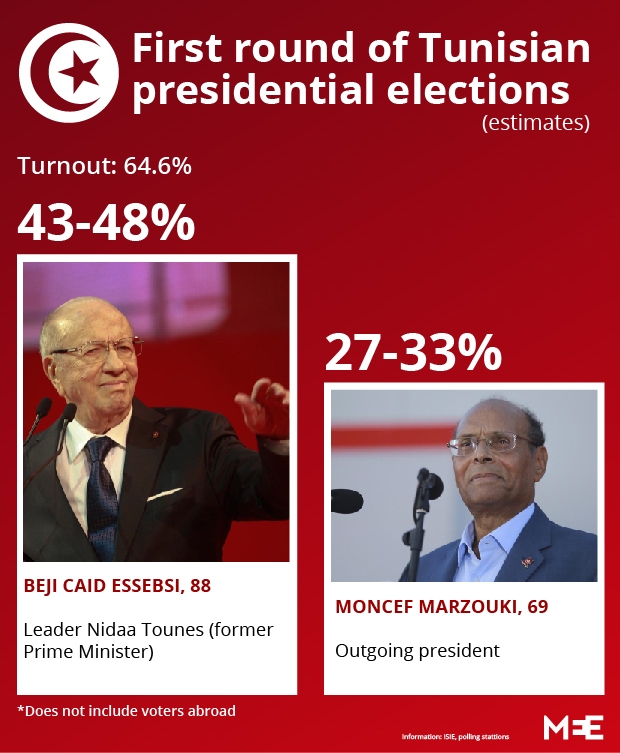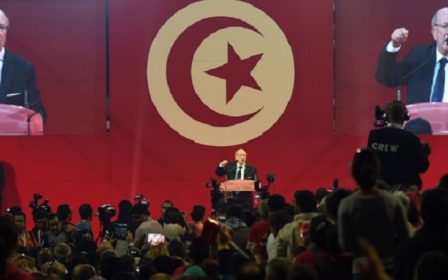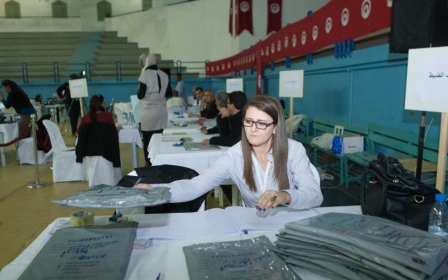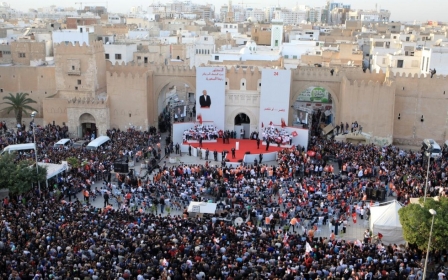Essebsi leads first round of Tunisia presidential vote by slight margin
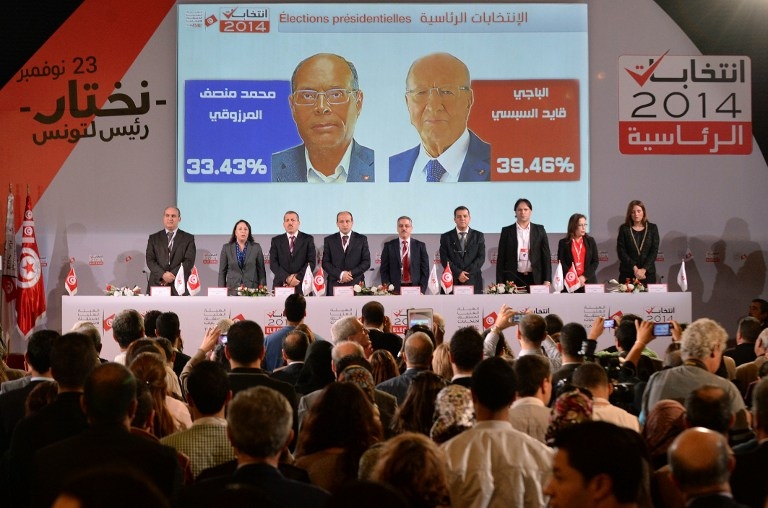
The head of Tunisia's Nidaa Tounes party, Beji Caid Essebsi, leads the country's presidential election with 39.46 percent of votes, six percent ahead of incumbent Moncef Marzouki, results showed Tuesday.
Marzouki secured 33.43 percent of votes cast in while leftwing figurehead Hamma Hammami came third with 7.82 percent, followed by London-based Islamist entrepreneur Hechmi Hamdi (5.75 percent) and wealthy businessman and football club president Slim Riahi (5.55 percent).
Sunday's election was the first time Tunisians had voted freely for their head of state since independence from France in 1956.
“The results show that it’s a very competitive election which is rare and should be good news for Tunisian democracy moving forward,” said Imad Mesdoua, political analyst at Africa Matters.
The North African nation that sparked the Arab Spring had known just two presidents - "father of independence" Habib Bourguiba and Zine El Abidine Ben Ali, who was forced to flee on 14 January 2011 by a popular uprising.
Marzouki was elected president at the end of 2011 by the National Constituent Assembly under a coalition deal with the then ruling Ennahda party, which came second in a parliamentary election last month behind Nidaa Tounes.
Round two
With none of the candidates managing to secure fifty percent plus of the votes, a second round of voting will now be held, with the date depending on any appeals, the head of the ISIE elections body Chafik Sarsar told reporters.
Veteran anti-Ennahda politician Essebsi, whose party placed first in a parliamentary election last month is now poised to face off against Marzouki, a secular politician who made common cause with the Ennahda against what he says is an attempt at a comeback by former loyalists of the former autocratic regime.
Much of the results will depend on whether the losing contenders endorse one of the two, observers say.
“We will see a lot of jostling and alliance building between the first and second round,” said Mesdoua.
“Candidates like Hammami and Riahi will be king makers; they’re in a strong a position to negotiate terms with either one of the two front runners bargaining for post-electoral positions either for themselves or their parties in what is going to have to be a coalition government,” he told MEE.
Supporters of Hammami, a radical socialist who headed the Popular Front in last month’s parliamentary vote, are more likely to go to Marzouki, but voters for Riahy, a millionaire businessman who is sometimes compared to Italy’s Silvio Berlusconi, will almost certainly go for Essebsi.
Ennahda had no candidate on Sunday, nor did they endorse one. But they hinted they might change their minds for the second round.
It is not clear how many Ennahda voters turned out for the first round, but if there were massive abstentions and Ennahda officially endorses Marzouki, this could have a significant impact.
“There is discussion that Ennahda’s stance on who to endorse may change in the second round,” said Seifeddine Ferjani, a researcher at the Round Table Studies (RTS) and who is also close to Ennahda Party.
"The biggest weighing factor is the polarising rhetoric which could inform Ennahda’s actions. [Essebsi’s statements] are likely to make Ennahada rethink its position on not endorsing anyone," Ferjani told MEE.
Essebsi insisted on Monday that only he could defend Tunisia against the threat of extremism.
"The people who voted for Marzouki were the Islamists... that is to say Ennahda members... but also the jihadist Salafists," he told French radio station RMC.
Ennahda rule was marred by a surge of radicalism and the assassination of two leftist politicians by militant suspects.
But Marzouki's camp has been portraying him as the last line of defence against a return to the autocratic ways of the old regime, while Essebsi derides him as an Islamist pawn.
Marzouki in a speech urged "all democratic forces" to back him against Essebsi, who served under both Ben Ali and Bourguiba.
"I am now calling on all democratic forces... alongside whom I have campaigned for the past 30 years for a real democracy, for a break with the past, for a genuine civil society and for a separation of powers," he said.
Marzouki argues that only he can preserve the gains of the uprising, while his critics say he hijacked the spirit of the revolution by allying himself with moderate Islamists Ennahda in 2011.
While the divide has been portrayed as a feat between Islamists and secularists, Mesdoua says the alliances will be built on economic affinities and how the candidates is viewed from an old versus new regime perspective.
“The nuance will be on where a particular party lies regarding old versus new regime,” said Mesdoua.
“The differences between Ennahda and Nidaa Tounis economically isn’t that big, but Nidaa Tounis is seen as more experienced in handling economic affairs because they had members who occupied government posts in the past,” he added.
If Essebsi wins, he will still have to form a coalition government, even with Ennahda, because Nidaa Tounes fell short of securing an absolute majority in October.
‘Historic moment’
Despite the exchange of polarising rhetoric, an election European Union observers on Tuesday called the vote "pluralist and transparent".
Annemie Neyts-Uytterbroeck, who headed the EU observer mission in Sunday's presidential election, described any irregularities as "minor".
"The exercise of freedom of expression and assembly was guaranteed," she said.
The contest for the expected runoff had begun even before the first round result became official on Tuesday.
Wasting no time in relaunching the battle after Sunday's vote, Essebsi called Marzouki the candidate of "jihadist Salafists", to which his rival countered by calling for "a debate on policies... not (a campaign of) insults".
The election is a milestone for Tunisia, where the ouster of long-time strongman Ben Ali set off a chain of revolts that saw several Arab dictators toppled by citizens demanding democratic reform.
US Secretary of State John Kerry hailed Sunday's vote as an "historic moment" in Tunisia's transition to democracy, and pledged Washington's support.
His French counterpart, Laurent Fabius, called for Tunisia's transition towards building new institutions to remain "inclusive and democratic".
Inspite of the presidential poll’s importance, the electoral commission said turnout was 60 percent in an electorate of 5.2 million people. Young people in particular seemed not to have taken part in great numbers.
Middle East Eye propose une couverture et une analyse indépendantes et incomparables du Moyen-Orient, de l’Afrique du Nord et d’autres régions du monde. Pour en savoir plus sur la reprise de ce contenu et les frais qui s’appliquent, veuillez remplir ce formulaire [en anglais]. Pour en savoir plus sur MEE, cliquez ici [en anglais].


